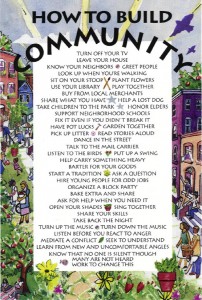Neighbor is a Verb
Neighbor is a Verb
My 91 year old mother uses the word “neighbor” as a verb. As in, “People don’t neighbor here anymore”. She grew up and has lived most of her life in an era when people didn’t lock their doors and neighbors came over unannounced for a friendly cup of coffee or to borrow the proverbial cup of sugar.
She bemoans the fact that in her later years in an upscale retirement neighborhood in Scottsdale and now even in a good-sized retirement home, people tend to keep to themselves, valuing (apparently) their privacy.
My husband and I live in a small apartment complex that we manage. We have screened our renters and have a wonderful, stable group of 8 families. We have patio garden and deck areas filled with growning fruit, flowers, veggies and.. children! It is alive, and there are multi-generations living and enjoying each other here.
I bring this up because last week a new UCSF research study came out that has spread like wild fire around the Net and print media. It was published in the Archives of Internal Medicine. UC Health describes the results in: Loneliness Linked to Serious Health Problems, Death Among Elderly.
NPR’s Michael Krasny interviewed one of the study’s authors, Carla Perissinotto, M.D., M.H.S., assistant professor in the UCSF Division of Geriatrics and Karyn Skultety, director of clinical and community services for the Institute on Aging in an excellent radio piece: Loneliness in Later Years.
UCSF researchers interviewed 1,600 participants and asked them basically three questions:
Do you feel left out?
Do you feel isolated?
Do you have companionship in your life?
These questions address issues of loneliness. Note that loneliness is not the same thing as depression which is more about a lack of enjoyment, energy and motivation.
It’s important to note, and something that surprised the researchers (but not those of us who work with older people), that people can be very lonely even though surrounded by people as in an assisted living facility. It’s about the *quality* of relationships, not the *quantity*.
Back to my mother’s use of the word “neighbor” as a verb. Recently, a print poster has been making the rounds in the media called “How to Build Community”. One of the to-do items listed that especially caught my eye was “Sit on your front stoop”.
How many of us do that in our neighborhoods anymore? Granted not all of us have front stoops! But, even metaphorically, have we gotten so insular and isolated and fearful of our privacy that we no longer know and look out for our neighbors?
“Aging in Place” or “Aging in Community” initiatives that I’ve been writing about are initiatives sweeping the country that are two answers to the isolation and loneliness people are experiencing, especially for those who are becoming predominantly homebound.
“Neighbor” is a verb. How can we begin to use it in our communities to help not only those of us who are growing older and becoming less mobile but also overwhelmed single parents, latch key children, kids with no grandparents nearby, widows, etc.
Perhaps, as the poster creator lists, we can “turn off our TV’s, sit on our front stoops, greet people, organize a block party, know our neighbors, hire young people for odd jobs, have a potluck, and dance in the streets”.
2 Responses to Neighbor is a Verb